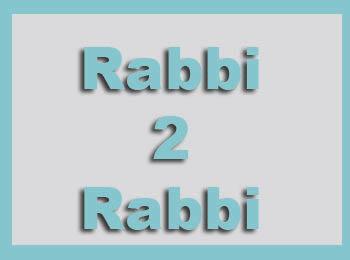As we educate our children regarding Torah and mitzvot, let’s not forget to teach them as well about the mitzvah of Jewish communal responsibility
Rabbi Adam Cutler
Beth Tzedec Congregation, Toronto
Rabbi Adam Scheier
Congregation Shaar Hashomayim, Montreal
Rabbi Cutler: We write to each other from hot, lovely Jerusalem. It was a pleasure seeing you (even at a distance) at the beautifully redone First Train Station. There is a special joy of seeing friends in our eternal capital.
I also had the privilege of being in Jerusalem last summer. With the war going on then, the city and country had a very different feel. There was a sense of terror and a pervasive nervousness. There was also a tremendous amount of national unity. There was no Medinat Tel Aviv, nation of Tel Aviv, existing a world apart. There was no longer these kinds of Jews and those kinds of Jews. There was one Israel.
This summer, the usual rifts seem to have returned. The settler leader I talked with speaks an entirely different language than the former soldier who served in his community. North Tel Avivians living in homes that could compete with the Vancouver real estate market appear oblivious at best (and antagonistic at worst) to the conditions and people in the southern half of their city.
Yet Kol Yisrael areivim zeh bazeh – we are all responsible one for another. In peacetime, how can we help instil a sense of unity in the Holy Land?
Rabbi Scheier: I would challenge your implication that we are enjoying a time of peace. Granted, the threat of horrific terror attacks seems more remote today, and I say that with gratitude and caution, as the café in which I sit writing this was the site of a homicide bombing just 13 years ago. But the conversations that consume Israeli society are about the threat of a nuclear Iran, the dysfunction of the Israeli Chief Rabbinate, the sexual impropriety of religious leaders, political corruption, and the recent arson attack on a church in the Galilee. This is not what we envision when we pray for peace.
But with all of the challenges, I still return to that deep sense of connection and belonging while in Israel. It’s what Rabbi David Hartman referred to as “mishpachtology,” seeing the Jewish People in the terms of a family system.
Still, your analysis begs the question: among all of our internal discord, identity politics, and leadership scandals, how do we deepen the sense of Jewish family that is so central to our survival as a people?
Rabbi Cutler: The best way to instil a sense of peoplehood, I believe, is through ongoing, regular interaction among different sectors of the Jewish community. Solidarity follows familiarity. We are more likely to feel a sense of kinship when we are intentionally exposed to Jews who are unlike ourselves. Such an approach may even warrant a reconsideration of denominationally based schools and camps.
Peoplehood can also be taught. As you quote from Rabbi Hartman, I finish my third summer in the institution that he founded as part of the Shalom Hartman Institute’s Rabbinic Leadership Initiative. One of the major themes running throughout my learning is peoplehood. As we educate our children regarding Torah and mitzvot, let us not forget to educate them as well about the Torah of “mishpachtology” and the mitzvah of communal responsibility.
While Israeli society is quite different from North America, I believe that North American Jews and Judaism have much to offer Israel. In what ways can Diaspora Jews affect Israeli Jewish internal cohesion?
Rabbi Scheier: Years ago, I would visit Israel and think that Israelis could learn a thing or two (or three!) about politeness from North American Jews. However, my thinking has changed somewhat. I am no longer convinced that North American Jews are as genteel as I once thought, and my understanding of the need for and utility of Israeli chutzpah has deepened.
Perhaps part of the contribution that Diaspora Judaism can make to Israel deals with the rabbinate. There are aspects of the North American rabbinate that are missing from Israel, both in terms of pastoral sensitivity and a decentralized religious model that avoids some of the systemic embarrassments of the Israeli Chief Rabbinate.
Either way, the dichotomy between Israeli and Diaspora Jewish society is worth considering further. Israel, for me, is a place where I feel at home. I consider myself as having one spiritual foot firmly established in Israel, even as my life is centred around my family and community in Canada.
